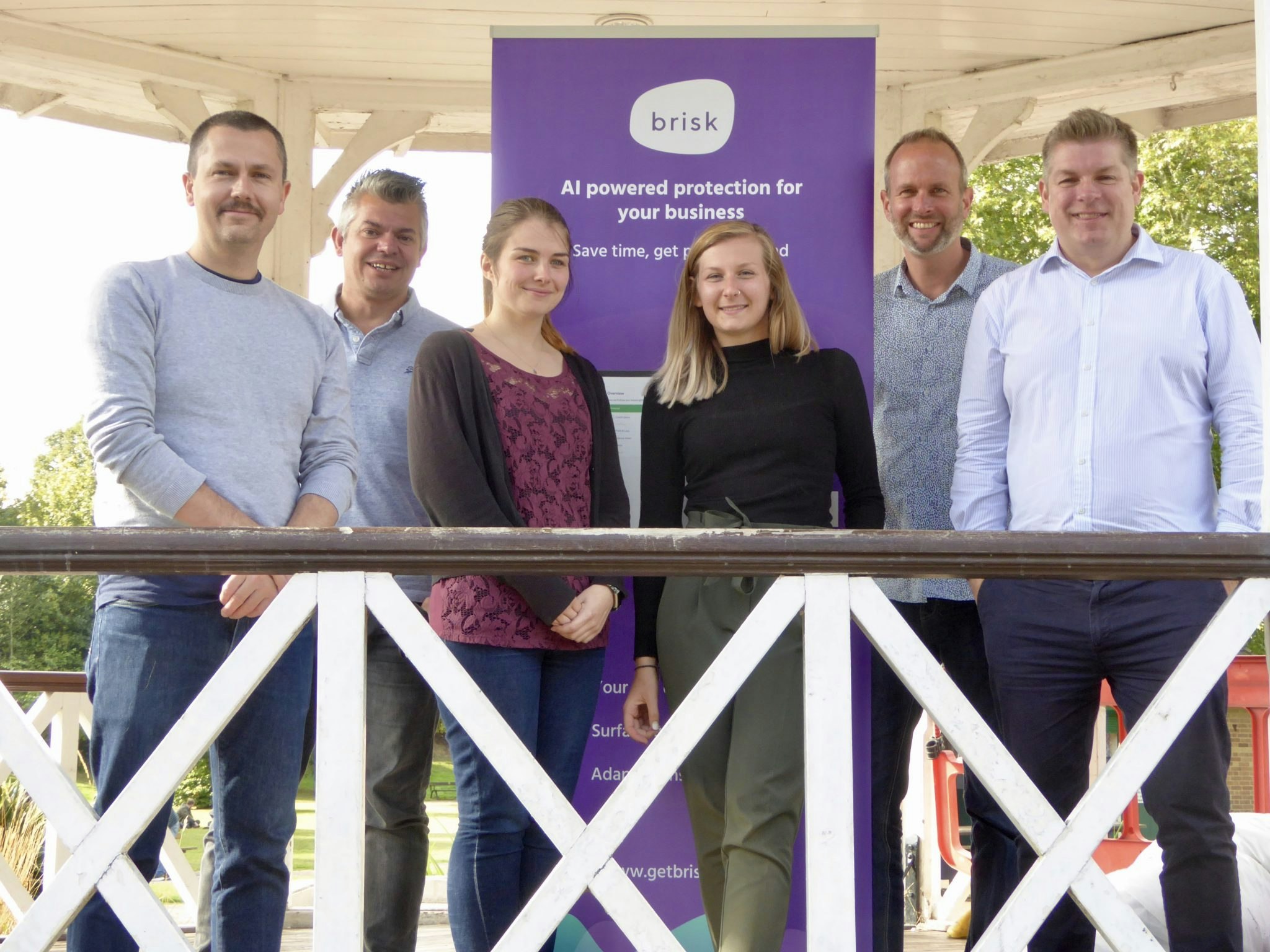When James Russell came up with a plan for using machine learning to create tailored insurance products for small businesses, he faced a dilemma.
It was a great idea with a potentially huge market, but his employer, British insurer Aviva, didn’t want to develop it internally.
I was quite conditioned to working in a corporate, and having a wife and family, it seemed a really big leap.
“It was pretty far out of their roadmap and there were more pressing priorities,” says Russell. On the other hand, Russell wasn’t sure about leaving 17-years-worth of corporate security to set up the business on his own.
“I was quite conditioned to working in a corporate, and having a wife and family, it seemed a really big leap,” he says.
So Aviva came up with a compromise. They sent Russell to Founders Factory, the London-based startup builder, where he could develop and test the startup idea, while still remaining, technically, an Aviva employee.
Eight months later the idea had turned into a 6-person company called Brisk, which is already generating revenue (Aviva is one of the customers) and which has raised a further £300,000 from external investors to take the business forward.
The rise of intrapreneurship
Intrapreneurship programmes like this are making a comeback, says George Northcott, co-founder of Founders Factory.
Companies have tried multiple ways of finding new ideas over the years, from investing in startups through corporate venture funds to running their own accelerator programmes for young businesses. Now, the somewhat old-fashioned idea of getting ideas from among their own staff is coming back into fashion.
We would never have had the insight to build Brisk without it coming from the inside.
In addition to working with Aviva, Founders Factory is also running intrapreneurship programmes with cosmetics company L’Oreal and Reckitt Benkiser, the health and hygiene company whose brands include Dettol, Strepsils and Durex.
LMarks, a London-based company that runs accelerator programmes for corporate clients, is also moving into intrapreneurship programmes, starting with a project to help employees at a large Japanese corporation develop new business ideas.
BASF, the German chemicals company, opened an in-house incubator — called the Chemovator — last December to help employees develop new businesses with coaching from entrepreneurs in residence.
Corporate employees are a great source of business ideas, says Northcott. “We at Founders Factory would never have had the insight to build Brisk without it coming from the inside, from James having a unique perspective of what that market opportunity was.”
But extracting those ideas and turning them into a real business is difficult, says Ben Thomas, head of development at LMarks.
Black hole
Most companies have typically tried some form of an "ideas vault" where they ask employees to submit proposals for new products and business ideas. Sometimes it is literally a physical suggestions box in the corner of the canteen, sometimes it is more sophisticated than that. But either way it doesn't work.
Ideas vaults are black holes, frankly. They stuck in all light and nothing comes out of them at all.
"They are black holes, frankly. They suck in all light and nothing comes out of them at all," says Thomas.
Ideas often end up in limbo with no decision ever taken to take them further. The Japanese corporation working with L Marks is trying a more structured approach where employees pitch ideas and a handful are chosen for a 16-week programme to develop a minimum viable product.
Similarly, at Chemovator, employees go through a formal pitching session and, if chosen, go through to a formal programme.
“BASF employees are always coming up with ideas, but these cool ideas often die because it is hard to find a real market for them,” says Lisa Schneider, innovation operations manager at Chemovator. “We wanted to offer a place where we would really develop these as sustainable businesses.”
Chemovator has so far had pitches for around 70 ideas from employees and has picked 10 to develop. Intrapreneurs get a total of 24 months to develop the idea. If it takes off, it can either be folded back into BASF’s operations or spun out of the business as a separate company. Around three of the 10 businesses being developed are candidates for being spun out, says Schneider.
It can be really difficult to be a relatively senior person at a corporate and to suddenly have people say that’s not how you do things.
One of the surprises at BASF was just how much coaching employees need to get into the startup mindset. Schneider recalls early pitch sessions where would-be intrapreneurs would turn up with a 50-slide presentation full of dense technical details — and not one mention of potential customers. In the end Chemovator created a 2-day bootcamp where they teach would-be intrapreneurs how to present their ideas.
Brisk’s Russell, too, said stepping into a startup mindset was a big adjustment. “I came in saying let's just build it, and Founders Factory said no, we had to go back to the beginning to define the problem, do proper customer research. It felt like we were going back, but I realise now it was important to do that,” he says.
Russell says the designers at Founders Factory convinced him, for example, to make it much quicker for new customers to start using the Brisk app, and to give them much more freedom for how they wanted to use it.
“I would have had a really long onboarding process because that was how I was conditioned to work,” says Russell. “It can be really difficult to be a relatively senior person at a corporate and to suddenly have people say that’s not how you do things.”

Different models
Intrapreneurship programmes take many forms.
Russell has created Brisk as a completely independent company outside of Aviva, and has now raised £300,000 of additional funding to get the business going.
The Japanese corporation, meanwhile, will retain ownership of any new intellectual property created through the intrapreneurship scheme. BASF plans to retain a stake in the companies that spin out of Chemovator, but will leave room for other investors to come in.
In some cases, intrapreneurship programmes are treated more as a staff training tool.
L’Oreal wanted their employees to work in a faster-paced environment and then take those learnings back to the core business.
“L’Oreal was very clear from the start, for example, that they wanted their employees to work in a faster-paced environment with fewer restrictions and less bureaucracy and then take those learnings and connections back to the core business,” says Northcott.
One L’Oreal employee was recently seconded to Founder’s Factory to help set up an influencer marketing company and later returned to L’Oreal — with a promotion.
“They very much see the secondment option as a way for their star employees to gain new types of experience and learn new skills,” says Northcott. “These big companies spend a lot of money on graduate recruitment and in keeping their star employees. They lose some people to startups now and they felt if they could give their best people the opportunity to work in startups for a while it would help their retention long term.”
The risk is that some employees, having tasted startup life, may not come back.
But then, where they may lose a worker, they may gain a close relationship with a new startup.
Although Russell has now chosen to leave Aviva to fly solo with Brisk, he has left with his boss’ blessing and with a feeling that a relationship still continues with Aviva.
“I don’t think they see me as being gone forever,” says Russell. “One option is that they could invest [in Brisk] in the future, or even buy it.”

